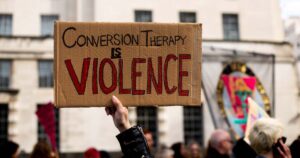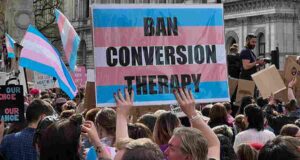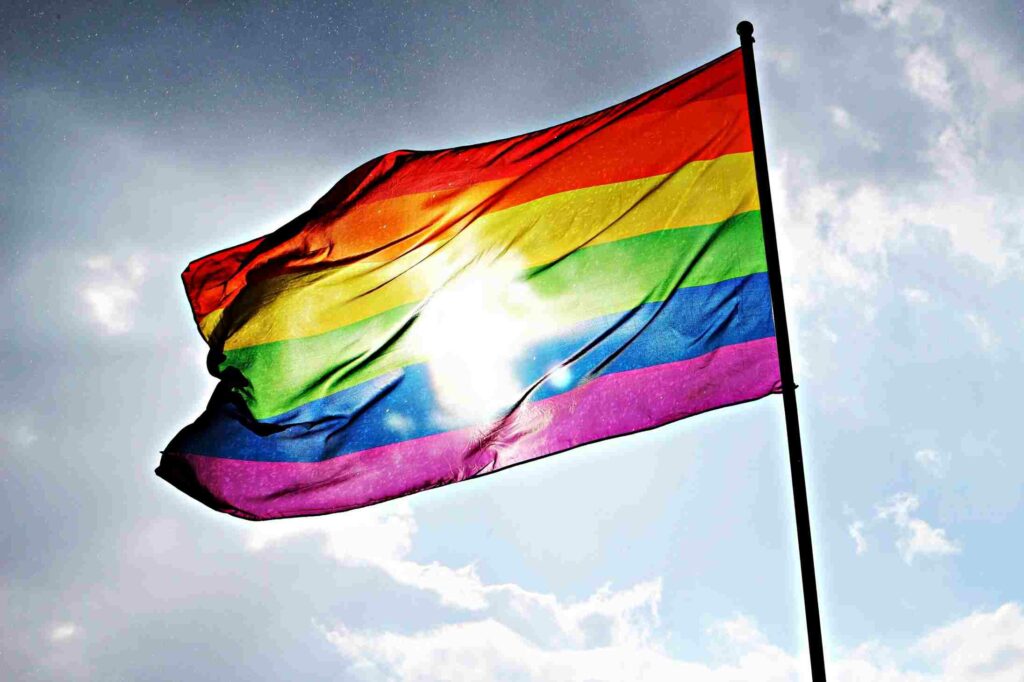Conversion therapy, a controversial and widely discredited practice, aims to change an individual’s sexual orientation or gender identity. Despite significant evidence of its harm and ineffectiveness, it persists in various parts of the world, often cloaked in cultural or religious justifications. This blog post explores the meaning, methods, and repercussions of LGBTQ conversion therapy, shedding light on the risks and more.
Contents
What is Conversion Therapy?
 Conversion therapy, often referred to as “reparative therapy,” is a set of practices intended to alter an individual’s sexual orientation or gender identity to conform to heterosexual norms or traditional gender expectations. Rooted in outdated and discredited psychological theories, this approach assumes that being LGBTQ+ is a mental disorder that can be “cured.”
Conversion therapy, often referred to as “reparative therapy,” is a set of practices intended to alter an individual’s sexual orientation or gender identity to conform to heterosexual norms or traditional gender expectations. Rooted in outdated and discredited psychological theories, this approach assumes that being LGBTQ+ is a mental disorder that can be “cured.”
These practices can range from psychoanalytic therapy to more extreme measures such as aversive conditioning. This may include painful or harmful physical techniques or psychological interventions.
Despite widespread condemnation from major medical and psychological institutions around the world, including the American Psychological Association and the World Health Organization, conversion therapy continues in various forms across the globe. It is based on the erroneous belief that being LGBTQ+ is unnatural or unhealthy.
What Are The Risks Of LGBTQ Conversion Therapy?
LGBTQ conversion therapy poses significant risks to individuals subjected to it, impacting them psychologically, emotionally, and sometimes physically. Here’s an overview of these risks:
Psychological Trauma
Conversion therapy often leads to profound psychological distress. This includes feelings of shame, guilt, and worthlessness, as participants are led to believe their inherent identities are flawed or unacceptable. This process can exacerbate pre-existing mental health issues or instigate new ones, such as depression and anxiety.
Increased Risk of Suicide and Self-Harm
The harmful rhetoric and rejection experienced during conversion therapy significantly heighten the risk of suicide and self-harm among LGBTQ individuals. The internal conflict and stigma reinforced by these practices contribute to a sense of hopelessness and isolation.
Loss of Self-Esteem
By promoting the notion that LGBTQ identities are incorrect or should be changed, conversion therapy can severely damage an individual’s self-esteem and self-worth. This can affect all areas of life, from personal relationships to career aspirations.
Social Withdrawal and Isolation
Individuals undergoing conversion therapy may withdraw from friends and family, particularly if their loved ones support the therapy’s goals. This isolation can deprive them of important support networks necessary for mental health and well-being.
Physical Health Problems
Some forms of conversion therapy involve physical methods, which can lead to immediate physical injuries as well as long-term health issues. Even non-physical methods can cause somatic symptoms like chronic stress, headaches, and digestive problems due to the intense psychological stress.
Relationship Issues
Conversion therapy can impair the ability to form and maintain healthy relationships. Trust issues, distorted perceptions of intimacy, and internalized homophobia or transphobia can complicate personal connections for years.
Erosion of Trust in Mental Health Services
Exposure to conversion therapy can lead individuals to mistrust legitimate mental health services. This may deter them from seeking necessary help in the future for fear of judgment or further harm.
The overall impact of conversion therapy can be deeply damaging. Hence, it leads to long-lasting repercussions that extend far beyond the duration of the treatment itself.
Why Should Consider A Ban On Conversion Therapy?
 Banning conversion therapy is a crucial step towards safeguarding the mental health, dignity, and human rights of LGBTQ+ individuals. There are several compelling reasons to consider such a ban:
Banning conversion therapy is a crucial step towards safeguarding the mental health, dignity, and human rights of LGBTQ+ individuals. There are several compelling reasons to consider such a ban:
Protection from Harm
Conversion therapy has been consistently linked to significant psychological distress, including depression, anxiety, and a higher risk of suicide. By banning these practices, governments can protect individuals from harm and reduce the prevalence of these adverse outcomes.
Scientific Consensus
Major medical, psychological, and psychiatric organizations globally, oppose conversion therapy. These organizations affirm that being LGBTQ+ is not a disorder and cannot be “cured.” The consensus is that conversion therapy lacks scientific validity and is fundamentally flawed.
Human Rights
Conversion therapy practices violate basic human rights principles. They are inherently discriminatory and often involve coercion and degrading treatment. Thus, aiming to deny or suppress an individual’s identity. Banning conversion therapy upholds the principles of equality and non-discrimination.
Promoting Acceptance and Inclusion
A ban on conversion therapy sends a strong message of acceptance and support for the LGBTQ+ community. It helps foster a more inclusive society where individuals feel safe and supported in expressing their true selves without fear of retribution or harm.
Preventing Misuse of Mental Health Practices
Conversion therapy often masquerades as legitimate psychological support. By banning it, governments can help ensure that mental health practices focus on support and well-being, not changing someone’s sexual orientation or gender identity.
Economic Impact
The adverse mental health effects and subsequent healthcare costs associated with conversion therapy can be substantial. By preventing these harmful practices, governments can also reduce long-term healthcare costs related to treating the psychological damage they cause.
Overall, banning conversion therapy aligns with modern scientific understanding and promotes a more humane, just, and progressive society. It affirms the rights and well-being of LGBTQ+ individuals and supports their inclusion in all aspects of life.
Which Places Have Banned Conversion Therapy?
 Several countries and regions around the world have implemented bans on LGBTQ conversion therapy, recognizing its harmful effects on the community. Here is an overview of some places where conversion therapy has been banned:
Several countries and regions around the world have implemented bans on LGBTQ conversion therapy, recognizing its harmful effects on the community. Here is an overview of some places where conversion therapy has been banned:
- Canada: In January 2022, Canada banned conversion therapy nationwide. The law makes it illegal to provide, promote, or profit from providing conversion therapy.
- United States: The legal status of conversion therapy varies by state. States like California, New York, New Jersey, and Massachusetts, among others, have enacted laws prohibiting mental health professionals from engaging in conversion therapy with minors. Some states have extended these protections to include adults as well.
- United Kingdom: The UK government has expressed its intent to ban conversion therapy, and as of the latest updates, is in the process of legislating this ban. However, the specifics and extent of the ban are still under discussion.
- Germany: Germany banned conversion therapy for minors in 2020. The law also prohibits the use of conversion therapy on adults who are coerced, deceived, or threatened into undergoing it.
- Brazil: Brazil has been at the forefront of banning conversion therapy since 1999 when the Federal Council of Psychology prohibited psychologists from participating in activities that propose treatment for homosexuality.
- Australia: Conversion therapy laws in Australia are enacted at the state level. Several states, including Victoria and Queensland, have passed laws banning conversion therapy practices.
- Malta: Malta was one of the first European countries to ban conversion therapy, enacting a comprehensive prohibition in 2016.
These bans are typically enacted to protect both minors and, in many cases, adults from the psychological harm caused by conversion therapy. The momentum for these bans continues to grow globally as more countries recognize and act against the dangers associated with these practices.
Conclusion
In conclusion, the global movement to ban LGBTQ conversion therapy is gaining momentum as more countries recognize its damaging effects. As an inherently harmful practice, devoid of scientific validity and rooted in discrimination, conversion therapy violates basic human rights and inflicts deep psychological scars. By outlawing these practices, societies can protect individuals from harm, and uphold the principles of equality and non-discrimination.
For more information, please contact MantraCare. The LGBTQ community encompasses individuals who identify as lesbian, gay, bisexual, transgender, & queer. If you have any queries regarding Online LGBTQ Counseling experienced therapists at MantraCare can help: Book a trial LGBTQ therapy session


